Text
Asian drama female lead passivity
I feel like a lot of aspects of female lead (FL) passivity is discussed (the fish kiss being the most famous example), but I wanted to systematically analyze each trope under the theory of female passivity and its feminist implications.
This topic has been stuck in my mind ever since I read a blog years ago (literally like six years ago so I’m sorry I have no idea where it is, I can’t link it) talking about how intimacy in Asian dramas is always portrayed as something women relent to giving up half-heartedly, and men one sidedly pursue. Women are chaste, men are lustful, and women are yielding to men, that is the essential message.
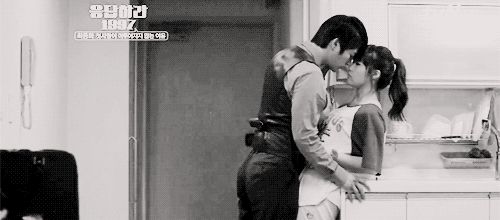
This dynamic plays out in Western media as well--the movie Don Jon is a super interesting analysis comparing how women are indoctrinated by romcoms, to how men are indoctrinated by porn. So women attach grand romantic gestures and romantic commitment to their self worth, because that’s what the girl gets in her happy ending, while men attach it to sexual prowess/having women do kinky sexual favors.
This dynamic is super harmful because it works to suppress female sexuality, as well as male emotionality. People are always surprised when a woman would rather just want sex (or a career) over a romantic commitment. And men are applauded for having the bare minimum of emotional awareness because it’s so rare.
I think a form of Asian drama female lead (FL) passivity that is most talked about is the infamous “fish kiss.” See exhibit A:
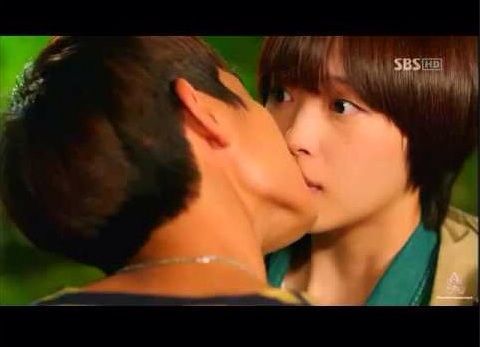
The guy initiates the kiss on the usually unsuspecting girl, as if the girl ever going in for the kiss herself would be too sexually aggressive. And as if even enjoying the kiss would be too much, they have her just stand there eyes wide open. It’s awkward, and even slightly funny to watch, but our critique often ends here. But I think the fish kiss is a symptom of a much deeper problem.
You will notice that female lead passivity is present in all physical interactions between the romantic interests.
The pull in hug:
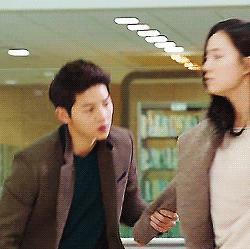
Which sometimes the FL looks uncomfortable to frightened in:
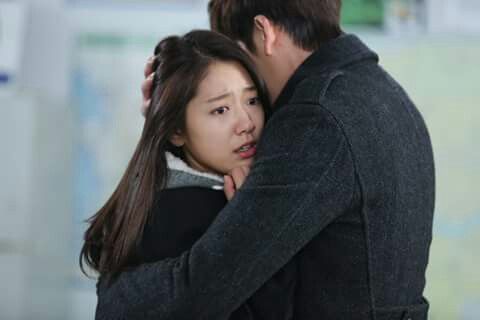
I even found a meme, so I know I’m not the only who thinks this is weird:

(meme/photo credit: https://goliath1357.tumblr.com/post/27115253892/kdramareasons-awkward-one-sided-hugs-k-drama)
What I don’t like about this trope is first of all, it makes female consent seem less romantic. It romanticizes this idea of male pursuit/female passivity, the man will protect her, the man will pursue her (basically like an object), the man will do all the work in making the relationship progress, etc., and it romanticizes this dynamic to women--this is easy to romanticize for us, because to the most of us that aren’t being constantly pursued by two hot men, this pursuit dynamic seems like a dream boat. Often the kdrama female lead (due to the Initial Misunderstanding trope) will even dislike and push away the male lead--and yet he still pursues her, how romantic! -_- Except in real life, the guy aggressively pursuing you and ignoring you disinterest is not romantic.
And the issue is on both sides, because it teaches women to just stand there, not express consent, and not express sexual/intimacy enthusiasm when we’re feeling it (that would be ~unladylike~). And on the other side, it teaches men to do all the pursuing and to assume that a girl standing frozen, wide eyed, and often looking scared as you kiss her, is consent. Sometimes the guy even interprets a clear “no” as consent. (Honestly I’m not even sure if these Asian drama writers are thinking along the lines of “xyz is consent,”...like I’m not sure how often they even think of the concept of consent tbh.)
But anyways, passivity. is not. consent!!!! That’s why we have the slogan “Yes mean yes,” meaning both parties must have enthusiastic, clear consent, for respectful intimacy. Asian dramas discourage women from expressing an enthusiastic “yes,” and it teaches men not to expect this “yes,” so they can steamroll past passivity and even rejection.
And I know some people will be boohooing me on this. “But sudden kisses and hugs are so romantic!” people will say. But what is “romantic,” like many things, is a social construct. We think things are romantic because they’ve always been presented to us as romantic, with swelling music in the background and the implicit understanding that anything is ok because they are Soulmates(TM) that end up happy together. We construct our idea of what is romantic largely out of media.
But that is not real life, and carrying those messages over to real life (as we inevitably all do), is dangerous. I just moved to Japan so this especially hits close to home for me: I dress conservatively by American standards, but I couldn’t bring a quarter of my clothes when I moved because I worried men on trains would interpret them as revealing, and therefore I would be “asking for it.” I, and I’m sure many women will feel me on this, think about and fear sexual assault very often. And when we don’t enshrine active consent, we perpetuate rapist culture.
Since “romantic” is anything our society constructs it to be, let’s romanticize enthusiastic consent! (like this NCT song!!) I think sudden kisses can be cute when you’ve established boundaries that it’s is ok, but it scares me that men and women are watching this and thinking suddenly kissing a person you haven’t discussed boundaries/intimacy with at all is cute. It’s all fun and games when it’s the hot male lead kissing the girl you know he’s going to end up with, but it’s not cute when it’s real life men thinking they’re entitled to women’s bodies.
Other examples of female passivity:
I stopped watching Moonlight Drawn over the Clouds at precisely this scene:
https://www.youtube.com/watch?v=X6I0WXeD-dc&ab_channel=KBSWORLDTV
because it was so painful to watch her sitting there like a fish as the guys got these cool fight scenes. Like girllll literally do anything, throw a rock, something! First dramas routinely disable the female characters by making the male characters the able fighters, but even if you’re not an able fighter you can do more than just sit there like a lame duck -_- Especially the parts of these scenes where someone is standing over the girl with the sword and the writers don’t give the girl the presence of mind to simply run away, but they give the guy the presence of mind to somersault into the room, jump over ten monkey bars, slash the antagonist, and catch the girl bridal style on his way down. I guess the damsel in distress trope is as old as the book, but just the complete passivity so many female characters show in fight scenes as they need to be saved is really annoying and disempowering.
I think the worst part is their faces, they’re all like omg! this is so sad!
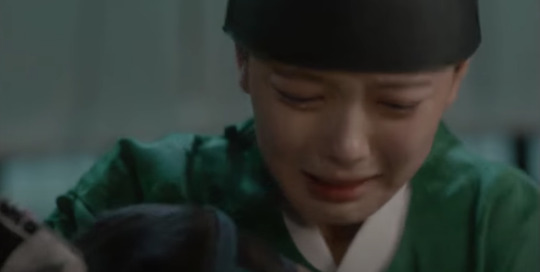
well girl you could have done literally ANYTHING other than sit there as he took ten bullets for you lmao. Women don’t exist to stand by and be saved!!! This is a historical drama but the modern drama version is when the guy is getting beat up by bullies or whatever and the girl just stands by and does nothing but look upset.
Another good trope that is under this passivity theme is the double wrist grab, where we not only have ONE male lead (ML) manhandling the FL, but TWO MLs. Ahh yes the only thing better than forcibly ignoring consent and the FL’s wishes is TWO men doing it.
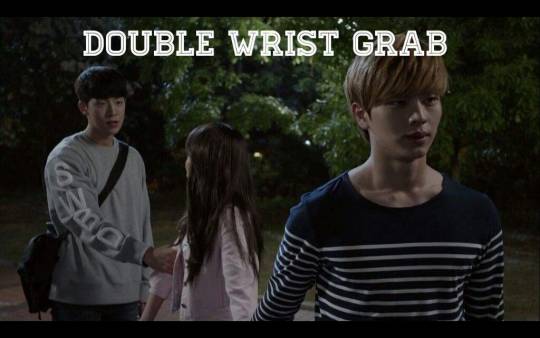
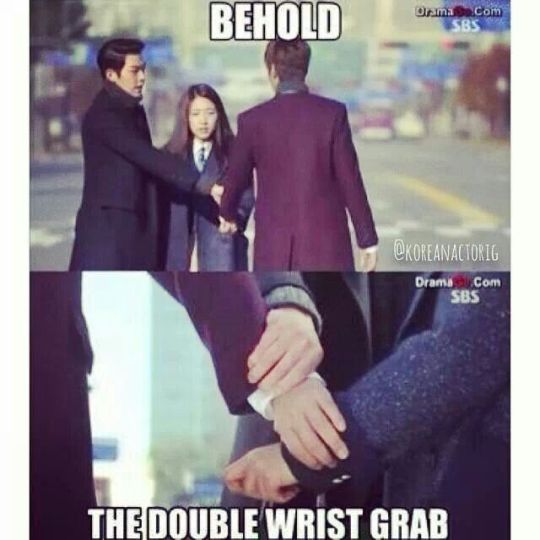
I heard this recently even happened in True Beauty...which...that drama...truly I thought Kdramas were progressing until I saw how much people were hyping up that mess of misogyny (not to mention how boringly predictable it was).
I can’t quite express this next trope in a screenshot, but something I also see a lot of is the ML professing his love to the FL and she sort of just stands there like O_O. Like she’s just sort of this object that sits there being admired? It’s just such an unnatural way to react to someone professing their love for you, and these scenes drag on for many minutes of just the ML’s dialogue so the female actress, having no lines, has no choice but to sit there O_O. Like give her lines! Give her reactions! Give her anything other than being wide eyed!!!!
And these physical interactions represent deeper emotional passivity in the female lead.
I’ve noticed it’s almost always the trend of the male lead falls later, but falls harder, and ultimately he puts more energy into making the relationship progress. Again, this buys into female fantasy, but it is an unhealthy fantasy that is grounded, I think, in our insecurities, and our fear of putting ourselves out there (so we would rather have someone pursue us than put ourselves out there and meet someone halfway).
This emotional passivity is why, weirdly enough, sometimes I will really like the drama because the girl is very stubbornly, openly, and aggressively pursuing the guy. A case of this is Itazura na Kiss, or Mischievous Kiss (there’s a Jdrama, Kdrama, and anime--I only watched the anime). Now the guy is downright meannnnn in Mischievous Kiss, this was not a healthy relationship at all, but there was something refreshing about the girl. Sure her aggression was in pursuing a man, but at least it was aggression, and I’d always only seen any hint of female sexuality/actively pursuing as something very stigmatized.
I think a sister trope to the passivity trope is the innocence trope. The guy will literally take the initiative to profess his undying love to the FL and she’ll be like “what?? omg stop teasing you’re joking ahahha.” Why do FLs need to be so oblivious/innocent? I think it caters to the way media is seen through a male gaze but that’s a trope to deconstruct another time.
65 notes
·
View notes
Text
“IU - Celebrity” Analysis
THE QUEEN HAS RETURNED!!!
I know it’s unhealthy to simp for celebrities...but IU is an exception. I have been rewatching her new comeback an unhealthy amount of times so I thought I’d share some things/details/background info :))
1) Background
So IU wrote about the lyric writing process this time and OMG I have to copy and paste her whole statement bc it’s so beautiful:
"I have a friend who has often been treated as an eccentric person due to her eye-catching outfit, her unique taste, dynamic talents, defensive mechanisms stemming from shyness, and a personality that clearly knows her preferences.
I loved her even more because of these unique characteristics of hers, but for the same reasons, she has been living under more scrutiny and hateful eyes.
These are the words I wanted to tell my 'unusual friend' that turned into the lyrics to this song but as I worked on the song, I realized that this is also my story as well.
After completing the song, I thought that anyone can be the main character to this song.
I'm sure everyone has felt left out at least once in their lives because they dont' meet the standards others have made.
I want to tell everyone, including my friend, who were born rough around the edges but special.
You are not a person from the star (common saying in Korea to mean someone weird/different) but are like a star."
OK THIS IS SO CUTE!! Because like first of all it’s so poetic...the play on words with you are not from the star, but a star yourself. And the fact that we are getting yet another song from IU that is not another romantic song. One of my long standing frustrations with the music industry (American, Korean, and Japanese), is songs tend to always center around romance, and IU tends to break those stereotypes (Bbibbi, Palette, 23, I-Land, 8, just to name her title tracks), and not only that but the fact that this is about her friend is just so beautiful T_T. Also did anyone else think of Sulli when they read this? Sulli was known for her eccentricity, different style, and being misunderstood, but the translation writes “I have a friend” in the present tense...so idk.
And just her wanting her fans/listeners to feel like the main character (ಥ﹏ಥ) (I’m not crying you are). This is especially such an important message for Korean and Asian fans in general. I only have my experience in Japan to speak to, but Asian collectivist cultures really punish those who stray from the norm, which not only ends up discouraging those from being unique and themselves, but also impedes social progress (feminism, environmentalism, social justice, animal rights, etc.).
And I also think it’s key where she wrote “as I worked on the song, I realized that this is also my story as well,”--more on that theme later when I break down the music video.
2) Music Video Analysis
The star motif
So she sort of does a play on words by putting a lot of star stuff in, star being another word for celebrity. And as the lyrics “You're a star painted with a left hand,” she’s talking about how this person isn’t the perfect/usual star, but perhaps a crooked/left-handed one...like the one shown to dot the “i” in the first image of the music video:
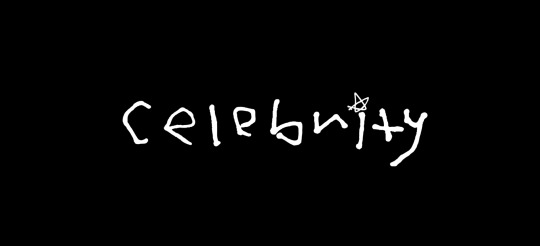
The star motif also features later around 1:09 in her dance, she draws a star with her finger.
The music video story
So basically it seems IU is playing two people--one is herself, a celebrity type figure dressed in glam clothes, and the other is the unique, “star” character (a stand in for her friend that she wrote the lyrics about). IU sings about the “star,” “A troubled outsider The walk, the style Through the earphones The music is all minor You have no idea Above your lowered head What the bright lights are Shining towards.”
The music video shows IU in glamorous clothes:
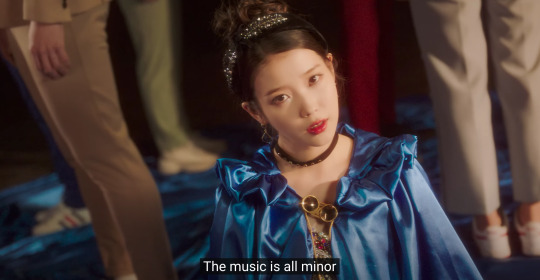
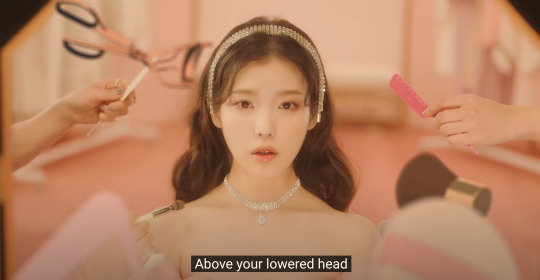
While this “star” character is in her unique/non-glam clothing, walking through the crowd.
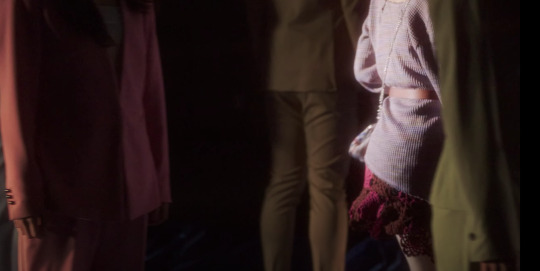
We can also sense IU’s isolation, she’s dressed like a princess in this glamorous pastel pink room, but she is alone, and the lights flash almost ominously outside, like the constant threat of paparazzi/people always surrounding her wanting to look in on her life:
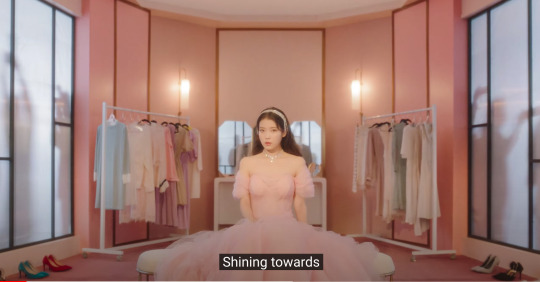
Or how the clothing racks gradually disappear, revealing her standing alone worriedly:
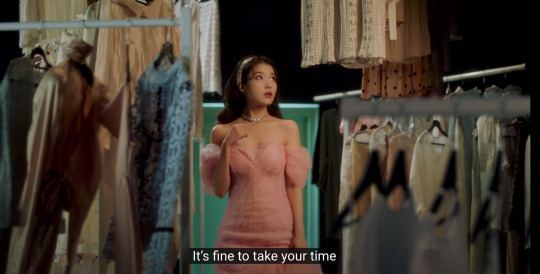
The next we see IU standing off to to the side (I believe it’s IU bc she’s in an undercover outfit, but it’s clearly very glamorous), as she hides from fans chasing her:
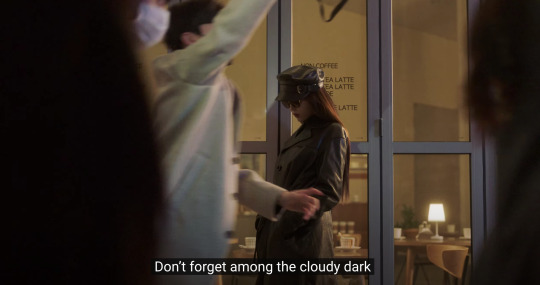
When the crowd passes, she looks around and catches sight of “star” IU, and is seemingly very taken by her unique beauty:
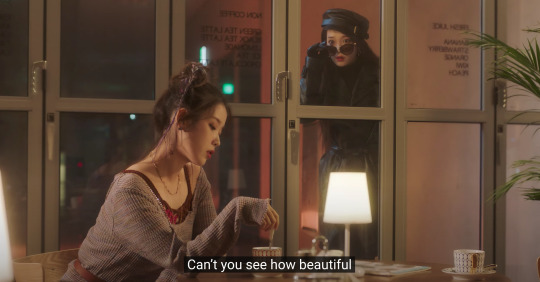
IU chases the “star,” but loses sight of her, and is once again alone:
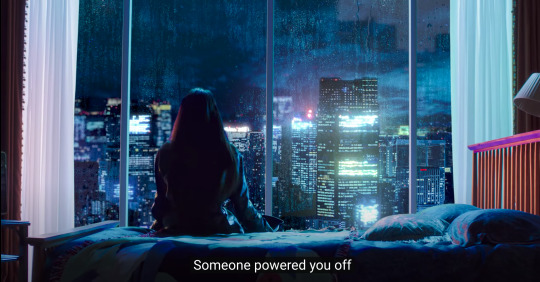
The irony here is that a) despite being adored and chased by many, the celebrity IU feels alone, and that b) despite being this glamorous celebrity, celebrity IU adores this unique “star,” that is just living her life, and not universally adored like celebrity IU. Celebrity IU almost seems envious of her freedom and unique style. But as the lyrics say, she also is upset at the way society treats the unique “star:”
“Your weary face looks like/ Someone powered you off/ The heartbeat went too quiet/ The glow you have/ The imagination, identity/ Are on a diet” “
These lyrics I had the most trouble with...I think it means the “star”’s imagination and unique identity are being starved/mistreated by society, like they are being forced to put on a diet.
Next we have:
“You have no idea/ Still not fully bloomed/ Written for you/ A bygone love poem” as celebrity IU works, it seems, on a love poem for the “star.”

Here the star motif features pretty literally, as she is surrounded by her poem writing as the stars fall across the sky. The “written for you, a bygone love poem” could also be a reference to IU’s other song, Love Poem? Also going back to how this could reference Sulli, I could help but be reminded of how IU wrote the song “Peach” about Sulli’s beauty and how much she adored her friend.
Next we see IU in front of this huge tapestry of celebrity IU, but this time she is wearing a dress studded with stars, and looking further up. She passes through the tapestry, and this could be like a sign of her growth? Like moving past her huge blown up celebrity image of herself to find her true self in a star studded dress?
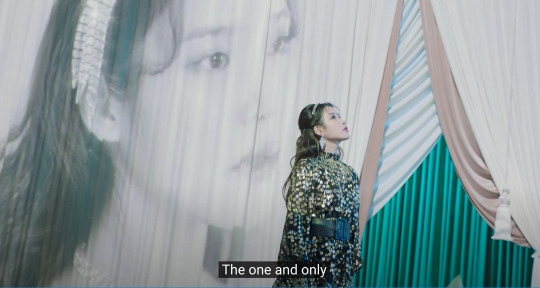
She then enters into a dark vacuum where she is surrounded by people dancing with lights (another continuation of the star motif):
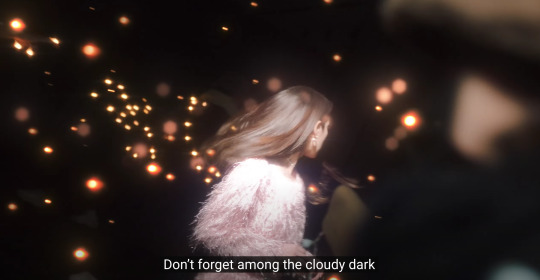
I think this is the turning point to the music video. Because now it is celebrity IU surrounded by stars. The next scene shows the people (all the people that once chased her) simply walking past her on the steps, perhaps alluding to how fame is ephemeral. She looks unsure and insecure here.
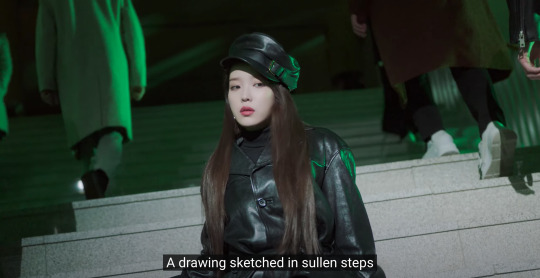
The next scene is most steeped in symbolism; she is in the same room that she was in alone before looking out at the city, but now the curtains are drawn (symbolizing privacy?) and IU reaches out towards an identical version of herself. Now the line between celebrity IU and “star” IU becomes blurred:
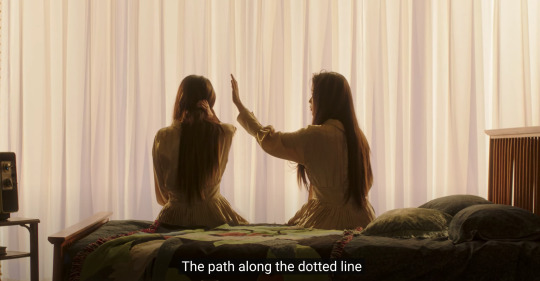
It seems that the left is “star” IU, and the right is celebrity IU, who continues to pine and look up to an almost indifferent “star” IU. “Star” IU gets up to leave, and morphs back into her “star” outfit from the beginning of the video, re-affirming that this is in fact “star” IU.
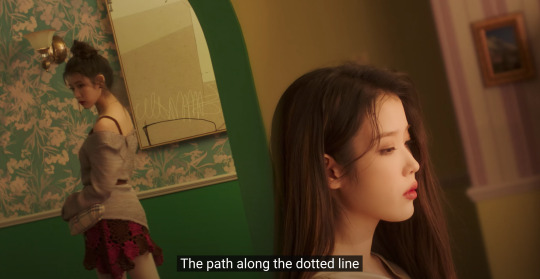
When celebrity IU notices she’s gone, she rushes up to find her (again paralleling her chase at the beginning of the music video), but when she goes to where “star” IU disappears, she is simply confronted with a mirror: she was the unique star all along!
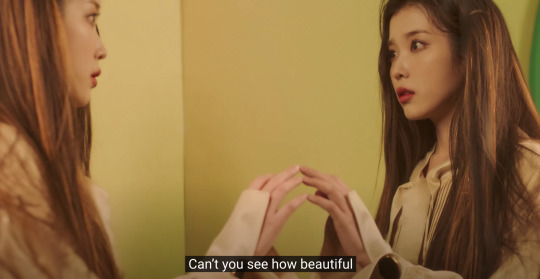
In a sense, the message here could be that our own unique beauty may seem obvious to everyone else (the viewer knew that “star” IU was the same person (IU) as celebrity IU all along, but it took celebrity IU the whole music video to figure it out.
Almost as if this whole sequence has been inside celebrity IU’s head, she seems to come to this realization on a red carpet surrounded by flashing cameras:
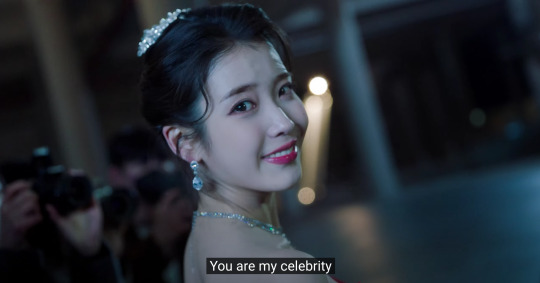
Here she breaks the fourth wall, looking directly at the camera, as if to now realize: “I have been my own unique “star” all along.” She looks at the camera as the music sings, “you are my celebrity,” perhaps to mean that the viewer is her celebrity, or that she herself is her own celebrity, and runs off, away from the cameras (as if running away from her fame for a moment), in her beautiful red dress, free and confident at last. In the past she has always been running to chase “star” IU, but now she seems to be running simply for herself:
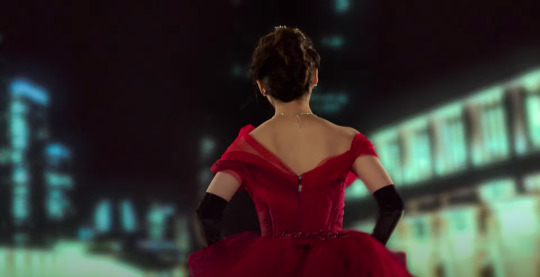
Messages/themes:
I think there are a couple of final messages here, and it is truly to IU’s credit that she was able to pack so many themes/messages into one music video. I think the dynamic I’m most interested in is how it runs the age old theme of the harms of celebrity fame, but it puts a very unique twist on it. While it shows the isolating aspects of fame, it also has a positive spin, that the love and affection bestowed upon celebrities isn’t necessarily a bad thing, but rather that we should redistribute that love and affection towards those closest to us, and see each other the way IU saw her friend. It also shows that fame and adoration don’t matter when you are insecure in yourself, given the irony of celebrity IU chasing after “star” IU.
This message that what matters most is cherishing and being cherished by those closest to you is interesting, because it can apply to both celebrities and non-celebrities. Celebrities may be adored, but it can be superficial, so they need the genuine love of close friends. Conversely, non-celebrities may feel super connected to their celebrities, but ultimately they need real life close friends. I think the message serves to both humanize celebrities in this way, while also saying that non-celebrities, and even weird/eccentric people, are deserving of the love and adoration we usually only reserve for picture-perfect celebrities.
I think perhaps the most poignant part, is the message of self-love: how at the end she realized that perhaps despite being pigeon-holed in certain ways as a public figure, she can reclaim her unique, beautiful parts. How we can be envious of others who seem set on their unique path and unafraid, but that we are unique and different too.
Also can we talk about how she served LOOKS!!! All of those outfits were GOLD. Anyways, I hope her music and its message reverberate with people who feel undeserving as “outsiders” and being eccentric. Being different is amazing. And as IU suggests, even though we may not be pop stars, we are all “celebrities” to someone. As the saying goes, “to the world you may just be one person, but to one person you may be the world.”
#iu#iu kpop#kpop iu#iu celebrity#kpop theories#iu celebrity music video#iu celebrity theories#iu celebrity analysis#iu comeback
67 notes
·
View notes
Text
parallel lines: running in run on

I have to applaud how layered and nuanced run on is, not only in terms of character development, but also in terms of cinematography. and one of the most salient examples is how the reoccurring theme of running is used to symbolize the progression and collision of the lives of our two leads.
in the first few minutes of episode 1, mi-joo and seen-gyeom’s activities are shown side by side, two seemingly unrelated lives running in parallel, while they’re also shown literally running, ultimately ending up at the same film festival. this sequence emphasizes how similar, yet different they are: seon-gyeom neatly ties up his white sneakers while mi-joo frantically slips into her worn converse; seon-gyeom leisurely jogs in his neighborhood while mi-joo sprints down the street, clearly pressed for time; seon-gyeom stops to pet a dog while mi-joo is angrily barked at by another; seon-gyeom gets his make-up done by a stylist while mi-joo does her own in the back of a taxi.
Keep reading
188 notes
·
View notes
Photo
THIS SCENE LIVES IN MY MIND RENT FREE

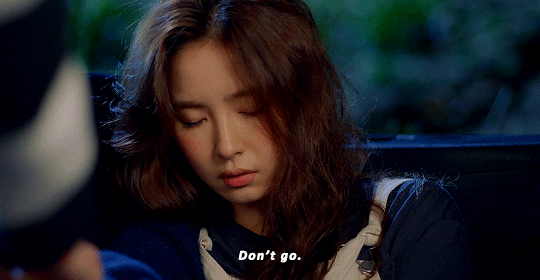

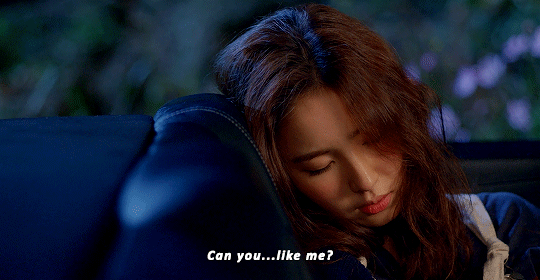
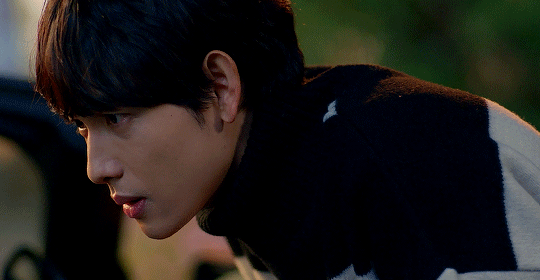
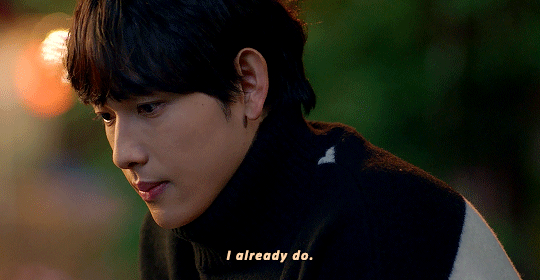
I don’t know. I just…I’m worried you’ll disappear. I won’t.
2K notes
·
View notes
Text
remember that you are the love of your own fucking life
52K notes
·
View notes
Text
How Run On subverts the noble idiocy trope
Another week, another amazing two episodes from Run On!! This drama really hasn’t let me down, and I want to go into detail about one specific aspect I really like, before quickly reviewing the last two episodes as a whole.
One thing that really bothers me w Kdramas--and Kdrama fans will be familiar with this--is the noble idiocy trope. And this is a trope that is pretty uniquely Asian, I think because of a cultural tendency to put quiet sacrifice on a pedestal. In Japanese, we call in 我慢 (gaman). The trope has traditionally manifested in “rich guy parents threaten poor girl that she’s ruining his future, poor girl breaks up with rich guy “for his good”” or the same trope setting, but “rich guy breaks up with poor girl so that his parents won’t bully her.” Another very common version of this trope is the tangent to the Dying Sick Girl/Guy trope, where the sick person doesn’t tell the healthy person so that they may live on happily without them.
The issue with this trope is multifold. First, it is disrespectful. It is most respectful to tell the whole truth to a person, and let them make decisions about their own future. It is not your call to make decisions on behalf of them, pretending to know what is best for them. At it’s core, I think it’s honestly super rude and it feels like you don’t trust their judgement, and see them as a child, rather than a romantic partner.
Second, it drags on angst for no reason. It’s yet another thing that could be solved with a very quick conversation, but isn’t. I don’t know why show writers do not seem to get this, but as an audience it is simply boring, because the emotional tension is all false. It’s not like there’s actually any deep conflict, it’s just a misunderstanding.
It also upholds the romantic drama/romcom promise of The One True Perfect Love. Making it out as if the person is lying/hurting/breaking up for the good of the other person, allows for conflict, without ruining the fantasy that there could be no motive for the character’s actions other than The One True Perfect Love. It is in fact the overwhelming force of this One True Perfect Love that is destroying itself (hurting someone for their benefit, because you just love them so much), and there is no need for the writers to actually come up with other character motivations, flaws, etc.
And in the face of this, Run On completely departs to create an actual multi-dimensional, realistic conflict for the leads (and I am building on some of the thought’s written in this amazing blog post). It was absolutely painful to watch them (maybe?) break up at the end of the last episode, but the conflict was not rooted in some lame misunderstanding that could be cleared up with a conversation. And it was not their unrealistic, undying, all consuming love for each other that was the only motive to their actions.
Of course they want what is best for each other (especially Seongyeom, as it’s his dad that caused the problem, so of course he feels bad), but their relationship is also new, and the dad being a creepy and unethical snooper is an immense pressure on a new relationship that were realistically expressed. The lines I liked most were actually Mijoo’s, where she says “Must I continue seeing him at the expense of myself?...Why must I continue wearing shoes that don’t fit me?” Referencing an earlier scene where she gives him a book on self-love, and shows him the chapter that says “don’t wear shoes that don’t fit you.” Meaning, in the same way she wants him to learn to love himself, she also doesn’t want to sacrifice her own self-love for the benefit of dating him. And she goes onto say, “I am precious to myself, so I want to give up [on their relationship]...you said it was ok, to say a mistake.”
There’s quite a lot to unpack there, but I like how she is being honest about her emotions, but also aware that her words right now are emotionally charged and might not reflect her real thoughts, (”you said it was ok, to say a mistake”). But more importantly, her clearly stated motives are that she is important to herself. She values herself. It is not some noble idiocy that is motivating her to break up with him for his good or for the greater good--it is for herself. And that is so refreshing, in the Kdrama world where everything has to be done sacrificially in the name of romantic love, and self-love is covertly seen as selfish/conceited. I actually don’t know if I’ve even heard an Asian drama character ever even voice that they are precious/important to themselves, and will set boundaries accordingly. AHHHHH I love this drama so much...even in the heart wrenching break up scene where I was yelling “No! No! Noooo!” to the computer, it still managed to break stereotypes.
Some final thoughts on these two episodes: THE SECOND LEAD COUPLE FINALLY GOT TOGETHER!! Omg. My friend and I watching the drama together (check out her blog @dreamctz) replayed that scene so many times. Their banter about what she should call him (him wanting to graduate early so that she would stop calling him “haksaeng”/student) was just *chef’s kiss*. And are we going to talk about how Seongyeom’s dad literally said he thought it was too bad he couldn’t HIT MIJOO!! WTFFFFF. That gremlin can catch these hands before he so much as TOUCHES my queen Mijoo. Also Shin Saekyoung’s acting in this was really superb in this episode, just wanted to point that out.
Also! because I was talking about this with my friend, there’s an extension called Language Learning with Netflix that allows you to see the Korean CC, English translation, and when you hover your mouse over the Korean, you can see the definition/meaning of each word and save vocab words! Just thought it was a super cool extension--I use it when rewatching old shows I love! It only works w dramas that already have Korean CC, which Run On does, so excuse me while I rewatch my favorite scenes until next week :))
#jtbc run on#run on kdrama#run on#kdramas#im siwan#shin saekyoung#feminism#kdrama feminism#mi joo x seon gyeom
158 notes
·
View notes
Text
Kdrama female leads eating a ton is not quirky or progressive?
Ah yes, the mysterious, bottomless, pit that is the Kdrama female lead’s gullet. Even from Kdramas dating back to the 2000s, female leads have had the superpower to eat inordinate amounts of food, usually shoveling it into their mouths before the male lead who shakes his head in wonder and teases her about it. And yet, despite this teasing, this scene is always used as a way to impress upon the viewer that this ability to eat tons of food distinguishes the female lead. She is Not Like Other Girls, who are dainty and stupid and care about how much they eat. No, our female lead is qUirKy. Somehow, eating a ton (usually chicken, beef, and other animal foods, which are tied to masculinity), is treated as a real personality trait that makes her more “real,” more boyishly cool, and unbothered.
But what purpose does this truly serve?
Overvaluing Masculine Qualities over Feminine Qualities
One issue with this trope is that it falls into the category of women being simply cooler for doing traditionally male/masculine things. This is not real empowerment of women to make their own choices, or for an appreciation of all types of women (women who like pizza and beer AND women who like salads and cute cakes). Instead it puts down other women for being “too feminine,” and places women on a hierarchy, with the most man-like women being at the top.
“She’s like one of the boys, [and therefore worthy]” leaves many women behind, as well as resulting in an under-appreciation of typically feminine qualities. Although this is a simple case of eating choices, this type of pseudo-feminism is the same force that makes society look down on girls who wear “too much makeup,” do plastic surgery, wear girly clothes, like pink, and have traditional feminine interests.
Gillian Flynn in the famous Gone Girl monologue states it better than I ever could:
“Men always say that as the defining compliment, don’t they? She’s a cool girl. Being the Cool Girl means I am a hot, brilliant, funny woman who adores football, poker, dirty jokes, and burping, who plays video games, drinks cheap beer, loves threesomes and anal sex, and jams hot dogs and hamburgers into her mouth like she’s hosting the world’s biggest culinary gang bang while somehow maintaining a size 2, because Cool Girls are above all hot. Hot and understanding. Cool Girls never get angry; they only smile in a chagrined, loving manner and let their men do whatever they want.”
Movies and tv shows only pretend to subvert societal expectations by having a girl that loves pizza, when in fact they are giving into the societal expectation/male fantasy of the cool girl that is worthy because she is like a guy.
Beauty Standards
This trope is more infuriating in the context of the harsh beauty standards towards women, especially in Asia. Perhaps if the female lead was constantly gulping down calorie dense foods, and then actually gained weight, I would find that relatable. That would make her more “real.” But because she does not eat to be more real, but to maintain a male (and societal) fantasy, she maintains her wasp waist and thigh gap while eating away without any care in the world. That is the opposite of relatable. It is downright harmful, because it perpetuates this expectation on women to both be beautiful, but to not care about being beautiful. To be gorgeous, but to be effortlessly gorgeous. If you care about being pretty you are shallow, but if you don’t put effort into being pretty you are worthless. There is no winning for the 99% of us that weren’t born with perfect genes.
I am continually shocked by how tiny these female leads are, and for a long time, I thought they were naturally that way. I assumed that they, just like their characters onscreen, were effortlessly beautiful. However, Youtube channels like my favorite one here, which documents various Korean celebrities’ journeys with eating disorders, shows that that is not the case. For example, IU, one of my favorite idols and actresses, was iconic in her Hotel Del Luna role; her enviable proportions and doll-like features and figure were a centerpiece of the drama’s aesthetics, and her costumes contributed to much of the drama’s buzz. But IU, while being naturally small, not only continuously talks of having to lose weight, but has been one of the few idols to honestly talk about her history with eating disorders. Most other actresses aren’t so honest, but I suspect many are not, in fact, effortlessly beautiful, and put immense work into, and undergo immense emotional duress and eating disorders, to maintain the figures that their characters then pretend to have so effortlessly.
So these actresses are forced, through extreme dieting, to present a perfect vessel of a beauty, that is then passed off in dramas as the result of no effort, and thus the cycle continues in society of women both being expected to be perfect, and also effortless. Kdramas are simply de-stigmatizing eating, when they should be de-stigmatizing having different body types. So women eating a ton is not quirky, it is not progressive, and it does nothing except reinforce impossible expectations upon women. I would prefer a female lead that is constantly worried about dieting and eats little--maybe then we could explore societal beauty standards on women. But as long as we pretend that the issue is not allowing women to eat, when the issue is actually not allowing women to be comfortable and confident in body types that are not stick thin with curves in all the perfect places, we will make no progress.
#kdramas#btw i love these dramas but i have to call them out#weightlifting fairy kim bok joo#feminism#kdrama feminism#strong woman do bong soon#coffee prince#my love from another star
67 notes
·
View notes
Photo
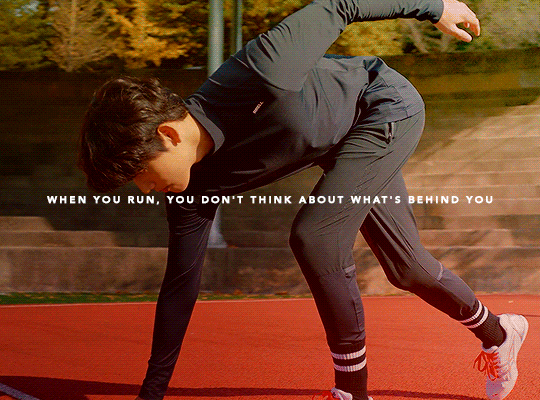
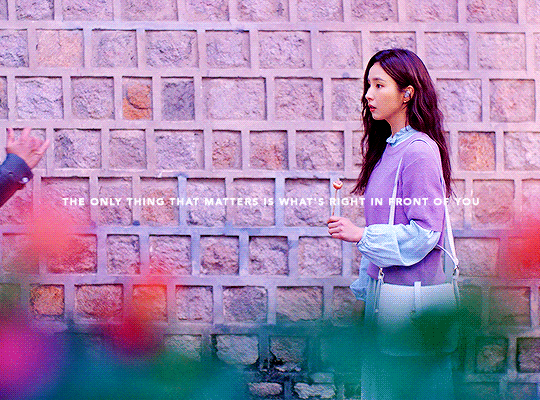
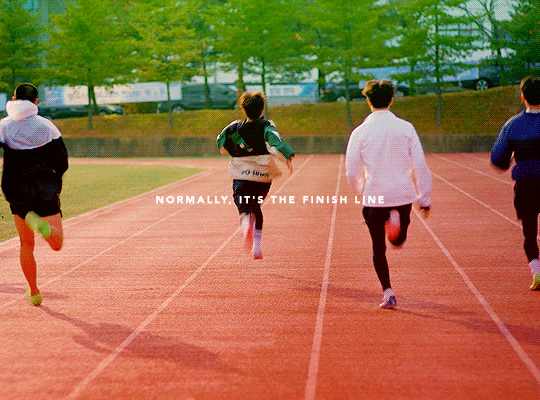
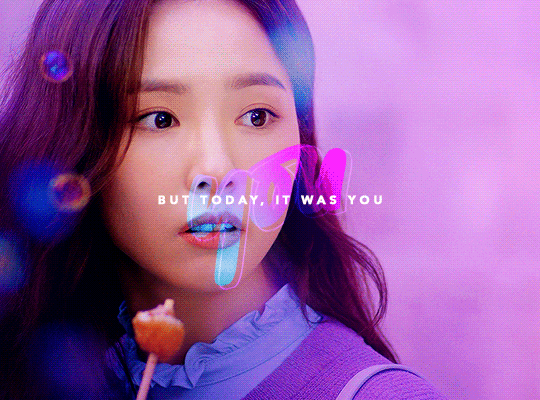
When you run, you don’t think about what’s behind you. The only thing that matters is what’s right in front of you. Normally, it’s the finish line. But today, it was you.
1K notes
·
View notes
Text
The healthy masculinity of Seongyeom in Run On
“Masculinity” itself is a difficult concept, but in this post I intend on using the word less in association to a person’s gender, and more as a characteristic that both women and men can embody. For example, I think Mijoo has masculine characteristics such as assertiveness, and Seongyeom has more feminine characteristics such as doing nurturing acts of service towards those he cares about. I believe a well rounded person has both masculine and feminine qualities, and one set of qualities should not be prized over the other (as masculine qualities are routinely over-valued in our society). (This is a complicated topic, so any discussion on gender/gender expression is appreciated and I am willing to learn!)
The typical toxic masculinity
Seongyeom’s healthy masculinity stands out starkly in a Kdrama sea of toxic masculinity. I have made a list breaking down toxic masculinity tropes in Kdramas, but essentially Kdrama Male Leads (ML) draw their masculinity from dominance over others. This is usually in the form of being in a dominating position over the female lead (FL), such as being her boss, being above her in a high school social hierarchy, or she is under some contract to serve him. He also usually dominates society at large, being the son of an heir, a CEO, etc., some position where he benefits from the capitalist exploitation of others. The scenes that showcase the ML’s masculinity are when he asserts dominance over the FL through wrist grabs, backing her into a corner, etc., or when he flaunts his wealth (the typical scene in an upscale store, “we’ll buy everything from here to there”), and provides these Grand Romantic Gestures via his wealth (helicopter rides, renting out a whole restaurant just to talk to her, etc.). He knows what he wants, he goes after it, and he gets it, the “it” often being the objectified FL. As viewers we are supposed to swoon over the fantasy of being dominated by this rich, hot man.
Seongyeom’s healthy masculinity
Now enter Seongyeom. Seongyeom does not really seek to dominate anyone--instead his masculinity stems from his defense of those weaker, and his commitment to his values. He is strong because of his goodness, rather than the typical male lead being soft/good in spite of his masculinity.
The core plot point is his relationship to Woosik: although him beating up Woosik’s bullies is a display of more typical masculinity, his overall protection of Woosik was not in that act of violence, but in his persistence to be held accountable for that act of violence. In the toxic sports world where violence was not held accountable, Seongyeom’s protest was not to commit the act of violence, but to openly admit it and force others to hold the act of violence accountable. He repeatedly states that non-defensive violence is not ok no matter what, breaking with the traditional toxic masculinity that a guy fighting for the girl or some other “valiant” reason is therefore okay.
Seongyeom has a rare integrity, and his unshakeable commitment to this integrity is what impresses his masculinity upon the viewer. The hallmark moment of his protection of Woosik is again, not in beating up his bullies, but in boycotting the race, and coming forward about the violence and demanding to be held accountable. This action was peaceful, but incredibly courageous. He is protective (a typically masculine trait) of Woosik, but not through violence or abuse of power, but by having the courage and integrity to do the right thing.
When he protects/supports Mijoo, it is also not in a possessive way. I think a prime example is when Mijoo gets sick: it’s a classic Kdrama trope, girl gets sick from overworking, guy arrives to save her. Any other Kdrama would have him arrive just as she’s fainting and catch her. Using his wealth, he would get the VIP room of a hospital for her. But Run On is different. Mijoo is able to get to the hospital herself--she doesn’t need saving. However, he arrives to stay by her side supportively, and when the old ladies are annoying her, instead of using a combative method, he is his normal, gentle self, and charms them into being more quiet.
The drama’s handling of Seongyeom’s privilege
A cornerstone of toxic ML masculinity is his position of immense wealth and power. Interestingly, Seongyeom also comes from a background of wealth and power. However, rather than fetishizing it, as kdramas tend to do, Seongyeom is clearly separate from his family’s background. This is established from the fact that rather than simply being a CEO inheriting his family’s company, he has made a name for himself as a runner, having his own profession, with his own unique skills. The drama generally refrains from ostentatious displays of his wealth, and his actions for Mijoo are acts of service and time (bring her a glass to drink her soju out of, taking the driver job for her, moving close to her so she has to walk less, and overall being a kind, supportive little bean to her), rather than servicing his immense wealth to her .
More importantly, it is how the drama handles the emotional impacts of Seongyeom’s privilege. Usually wealthy, but lonely backgrounds are used as an opportunity to excuse the male lead’s disrespectful behavior, to explain away his shitty personality, and also as an opportunity for the cheerful and kind female lead to “heal” the male lead. I cannot stress how much this trope disgusts me, as this “broken man just needs the right, patient woman to fix him” narrative is the kind of mentality that keeps women in domestic violence relationships. It is so harmful, and also serves to put down other women (I need to prove I’m different from other women, I understand him, I can change him, I will succeed where other women who were too shallow to understand his scars have failed, etc.). Seongyeom is far from a jerk male lead, but he still has emotional difficulties from his upbringing, primarily that he is inexpressive. Jerk male leads are also inexpressive about their emotions, and usually heap verbal abuse upon the female lead, but it is just brushed off as a “quirk” that the girl must put up with because she knows, ultimately, through his Grand Romantic Gestures, that he loves her. In Run On, his inexpressiveness is instead treated as a real problem that he must work through. He journals his feelings to work through them, and undergoes difficult discussions with Mijoo about his tendency to put up walls. It is shown as part of his growth, rather than something Mijoo must just accept.
Mijoo is key to Seongyeom’s healthy masculinity, because so much of toxic masculinity is based off of the female lead’s passive, objectified state. The toxic trope of Power Imbalance cannot work because Mijoo is a financially independent, career-driven adult. The One-sided Pursuit trope also cannot work because Mijoo is always willing to put in her share of the effort in the formation of their relationship. She meets him halfway, and maintains open communication of their problems so that there is no space for weird toxic male jealousy/noble idiocy tropes, etc.
As I’m writing this I realize maybe why I like Seongyeom so much is not just because of his healthy masculinity, i.e. healthy ways of being protective, strong, etc., but also because of how in touch he is with femininity, and vice versa with Mijoo both being a blend of masculine and feminine qualities. I really love this drama so much, and I can’t wait for the episodes to come <3
259 notes
·
View notes
Text
How Asian dramas simultaneously fetishize and denounce extreme wealth
(This is not necessarily unique to Asian dramas, and fetishization of extreme wealth is present in most neoliberal capitalist societies, but that’s just the genre I’m most familiar with)
It has always bothered me that Asian dramas will simultaneously invite viewers to oggle over the luxury, convenience, and fantastic life of those in extreme wealth and power, while simultaneously seeming to wag their fingers at us that money is not that important, because they can’t have the “message” be something superficial. It is a contradiction that appeals to the most basic part of human nature: we wish wonderful things that bring us an advantage over others, but we don’t wish that they come to us because we chase after them, which would be unseemly. A good example of this is the “naturally beautiful girl” trope. She is not like other girls, she eats pizza and doesn’t wear makeup. But, she is a size 2 super model beauty. Guys will say they want a “natural” girl, but she must be naturally beautiful. We want the good thing without the embarrassment of admitting we want it.
Applied to Asian dramas and wealth/power it works like this: there will be multiple scenes throughout the Asian drama that show the power, benefit, and appeal of extreme wealth. Usually it is the male lead that holds this wealth/power, and he uses it to his advantage to woo the female lead through the Grand Romantic Gesture (I’ve said this in other posts, but things such as renting whole stadiums/restaurants/hospitals to talk to the girl or throw some event for her, or through buying her expensive presents, paying her debts, etc.). The male lead is of course well dressed and surrounded in luxury. As the viewer we are bombarded repeatedly with how great it is to be wealthy, how wonderful it would be to have an extremely wealthy and doting boyfriend.
The case of this that disturbed me the most was actually in Crash Landing on You, where the male lead is actually the son of a top general in North Korea. Like literally why? Why can’t the male lead be someone normal? Even in a fantastical situation as being in North Korea the male lead has to have wealth and power! And not only does he have wealth and power, but there are many cases that again show how great it is that he has these things...IN NORTH KOREA! I remember one specific scene where because he has special privileges, he has a car license plate that allows him to drive through traffic unimpeded; he gets special treatment over others that allows him to never have to stop at traffic lights basically, and this is all framed in a very positive way, in that it allows him to rush home to his beloved and save her. Don’t get me wrong, I actually loved Crash Landing on You and enjoyed the show, but it shocked me that even this constant focus on how great it is to be wealthy and powerful would carry over into a drama about North Korea, where wealth and power inequality are at a point where tons of people die from starvation and are malnourished. It’s not attractive at all for a person to hold power in North Korea, because it means so many others are suffering from scarcity, so it is disturbing for scenes which display immense wealth and power to be played out with inspirational, exciting music in the background, showing how great it is to have a guy of immense wealth and power.
I think a case of this trope that bothers me the most, however, is Boys over Flowers. I’ve only seen the Japanese version, so I can’t speak to the experience of the Korean version, but I’ve heard they are similar. We are again, repeatedly bombarded with how romantic and wonderful it is to be rich, with the male lead repeatedly able to win her over with expensive Grand Romantic Gestures, but the drama also claims this weird moral high ground of constantly telling the viewer that wealth isn’t, in fact, important, by having the male lead fall for the female lead’s plucky, impoverished, state. She’s different, she is attractive, she is good, because she does not care about wealth. So as a viewer we are simultaneously invited to see the splendor and romance of immense wealth, while being told we should reject it or else we are bad people. And of course the female lead ultimately gets to have it both ways: after holding the moral high ground by supposedly “not caring” about wealth, she still gets the wealthy boyfriend, and lives a comfortable life. It’s not like at the end they truly denounce wealth, give all their money to charity, and go live a lower class or even middle class life.
The reason why I hate this so much is because again, I hate the subtle direction of making something out to be wonderful, while shaming those who pursue it. We look down on girls for trying hard to be pretty, while also idolizing prettiness and lavishing attention depending on external attractiveness. Likewise, we shame those for chasing wealth, seeing them as frivolous and shallow, while also continuing to uphold a classist society where extreme wealth gives you not only economic, but more social power, and affords you respect.
First of all, I would like to see more dramas about normal people, and I believe it is going in that direction. No one has to secretly be a CEO’s son. And when we ween ourselves off of consuming images of extreme luxury (I think reality shows play a role in this as well), we may find that extreme luxury is not what we are really after. We envy the convenience, the lack of worry, and the luxury to pursue one’s own interests--perhaps it is not private jets that we need, perhaps we are pining after a sense of security that so many of us lack and world where we don’t have guaranteed healthcare, where generational wealth has a stark racial divide, where we cannot afford higher education.
14 notes
·
View notes
Text
Kdrama Sexist/Toxic Male Lead Tropes
(originally made this post as part of another post about Run On but it got to be so long I just thought I’d made this list it’s own post)
-Possessive and easily jealous, and this is often played off as romantic. For a large portion of kdrama watchers who are younger, and for the majority of us who aren’t chased all the time by hot men, this toxic trait can easily be sold to us as an exciting and flattering trait. But this is in fact not respectful of the female lead’s autonomy. I enjoy the little humorous jealousy moments, (I am reminded of Crash Landing on You) but too often this leads to the classic “two male leads each grab the innocently wide eyed female lead and glare at each other” trope. Women are not ropes to play tug of war with! If jealousy over the instances like the girl simply having a conversation with another guy rupture into real problems in the relationship it is not romantic, but possessiveness is often mistakenly portrayed as an expression of love, when really possessiveness is just that: possessiveness over an object.
-Uses violence to solve problems. This is another thing that can be easily seen as flattering--someone is willing to go to great lengths to protect you/defend your honor/whatever the reason is for the male lead to use violence. This trope was deconstructed in the American movie 500 Days of Summer, where the male lead punches a guy “to defend the honor” of the female lead, but she when she is upset and embarrassed at the situation, he gets angry at her for not being excited over his violent sacrifice.
-The typical “tsundere” narrative of abusive language, but paired with romantic gestures, usually the Grand Romantic Gesture trope. I see this all the time, where the guy berates the girl, sometimes to point of just full on bullying, but then he throws his jacket at her when she’s cold, holds the umbrella over her while he gets wet, etc., In other words he may be verbally abusive but it doesn’t matter because he Truly Loves her. And that she should accept that and understand that about him and not expect him to be polite and respectful.
-He treats everyone but the female lead like trash. Well...he often treats the female lead like trash at first too, but this quality is also marketed as flattering. He treats everyone badly but you’re different! In reality this is super toxic. In fact, it is essential that a person treats *everyone* with decency if they are to meet the baseline requirements of being a person capable of giving and receiving love in a healthy relationship.
-He chases her one sidedly. Oftentimes he chases her even when she rejects him, which shows that dominating, male persistence is a behavior to be rewarded. Again, this is a fantasy easily marketable when many of us aren’t chased around by hot men. It is flattering for a person to be so interested in us that they are incredibly persistent, but this fantasy had very unhealthy, and even harmful real life connotations. There is a very important line between friendliness/respectful attention/flirting, and creepy and domineering. I think it is also equally important to note that in this toxic trope, it is important to teach both men and women that no means no and yes means yes. Not that you can’t have playful/teasing banter, but playing hard to get when you really want to be gotten, is an unhealthy coping mechanism for cowardice in relationships.
I think for this one as with other tropes on this list, it appeals to our childish, insecure, and relationship-immature side of ourselves that would rather have everything fall into place than be honest, vulnerable, and have agency in our romantic interactions. What I mean is, the fantasy of a hot male lead persistently pursuing us after a destiny meet cute is a fantasy where we don’t ever have to put ourselves out there. Where don’t have to consciously try to meet new people, express interest in others, set boundaries, i.e. do the hard work of negotiating our place within other people’s lives.
The hallmark of a bad drama for me is when the give and take between the male and female lead is: the female lead has to put up with the meanness and constant mistakes of the male lead as he hurts her (usually in tangent with the Noble Idiocy trope, where he breaks up with her and steps all over her “for her own good” for some bs reason), but in return she gets the Grand Romantic Gesture, and the male lead does most of the chasing. In a healthy relationship, there aren’t constant hurtful arguments, and both do an equal share of the “chasing,” or a better term would be meeting each other halfway in expressing interest in the other.
-Power imbalance. It really disturbs me how Kdramas fetishize power imbalances between male and female characters to create the helpless/incompetent/somehow indebted but also plucky/cheerful/abuse-taking female lead. This can manifest itself very overtly in the many Kdramas between CEOs and secretaries, which I still cannot believe are popular in 2021. Secretary Kim did a better spin on the usual trope--the secretary holds the power of being very good at her job, and therefore indispensable and respected in her own right, but it remains a mystery to me why these super narcissistic and childish CEOs are played off as “adorable manchilds” that always need a little soothing of their ego. But to return to the power imbalance, besides obvious power imbalances of wealth/power/etc., oftentimes the guy has supernatural powers, or by nature of his job has abilities that render him the “protector” in the relationship (My love from another star, descendants of the sun), or the girl is infantilized in some way to need to protection from the male lead (legend of the blue sea, she is a mermaid and therefore dependent on the male lead for guidance in the human world, bring it on ghost as well). I think these latter power imbalances are constructed into the setting of the story because more overt forms of power imbalances are frowned upon now, but they serve the same patriarchal purpose.
This power imbalance inevitably leads to the female lead putting up with some abuse from the male lead because she “needs” him for some other end, and him holding his power over as a way to keep her close. It fits very well into the enemies to lovers trope in this way, especially some contractual enemies to lovers, where due to the power imbalance he is able to exploit/use her in some way, and keeps her close, and she hates him but has to put up with it for her own survival in some way, but they slowly fall in love. It’s super toxic and not at all romantic because they didn’t choose each other at all, they just were pushed together by circumstance, but again it buys into our fantasy of falling in love due to circumstance, rather than our own agency.
-Overly protective (OP) vs respectfully supportive. (RS) Essentially I can divide Kdramas into these two categories, OP and RS. OP romances can commonly be found in love triangles (where jealousy flourishes) and high school romances (where characters usually have less of a personality lol), and RS relationships are more common in working adult romances, where each character is pursuing their career/dreams and they support each other in those dreams. OP relationships infantilize the female character, render her as just an object in need of saving, and power dynamic between the leads is usually he constantly needs to save her, and in return she “softens”/“heals” him which, under deeper analysis, reveals itself to be quite an insidious and harmful stereotype, the kind of psychology that keeps women in domestic violence relationships. RS relationships are also better in that the leads have something going on outside of their romance, and are motivated beyond just ending up together. My favorite of RS relationships are Miss Hammurabi (two judges that work together to confront injustices in the judicial system), Run On (two leads from v different career fields, but they take interest and support each other throughout career ups and downs), and Hello My Twenties (probably my favorite example of an RS male lead--Sungmin supports Song as she uncovers her past traumas and stands up to an abuser, but does so following her lead and not doing her work for her, but rather simply staying by her side supportively).
Conclusion
This is not all the toxicity in the kdrama world--this is just what I can come up with off the top of my head as my least favorite tropes that disempower women and glorify toxic men and toxic relationships. And of course this is not a problem unique to Korea, and is by no means a condemnation of Korean culture, etc., but I simply happen to enjoy the aesthetics and innocence (compared to American shows haha) of Kdramas, so that is the entertainment world I am familiar with, and feel able to comment on.
114 notes
·
View notes
Text
Age of Youth - Song & Sungmin - Favorite Kdrama Relationships
(spoilers for Seasons 1 and 2 ahead!)
I know I am late to the party. Age of Youth started in 2016 and the second and last (but hopefully not last T_T) season ended in 2017. As much as I love Kdramas, it is so hard to find a show that doesn't glorify toxic relationships and men, and it is so hard to find media (Korean or otherwise), that focuses on the friendships and lives of women, that when I started Age of Youth, it quickly claimed a very special place in my heart.
I am extremely saddened to think that makers won't see the potential and the demand (even without Son Seung Won of course) for a Season 3. Of course I want more stories of sisterhood--I could never get enough of the various friendships and trials of Belle Epoque, but I have to admit (as much as I believe friendship is underrated and romance is overrated in media), that the most unresolved part of the show that I would like to see a Season 3 for, is the Song x Sungmin couple. (thoughts and speculations on the continuation of the show here)
Song and Sungmin were a revolutionary couple for me because for once, I understood why they liked each other. Usually in Kdramas everything is left up to "fate." Fate throws a good looking man and a good looking woman (there's always the assumption of heteronormativity, which is a whole other conversation), they happen to live together, or they bump into each other everywhere (seriously, the leads always manage to accidentally see each other in extremely big cities like Seoul?), or they get into some awkward situation that leads to romantic tension and bam! They go from hating each other to suddenly risking their lives for each other.
But with Song and Sungmin there was none of that lazy deux ex machina writing. We don't even see how they met each other, and we get to skip the whole destiny meet-cute which I see as a really harmful narrative in society on creating unrealistic expectations. They are friends through working at the same newspaper club at university (a shared interest!). They work well together and always have stuff to talk about. Their personalities compliment each other and they seem to have fun when they spend time together, and not just in the superficial couples montage way that I see in dramas a lot where the couple just goes to an amusement park and they try on silly sunglasses together. I always wonder in those scenes, what are the leads even talking about? They usually don't even have any shared interests? These two genuinely seem to have fun talking and being with the other in a more fundamental way than that. There's also no weird power dynamic at play (boss and secretary/employee which is SO common), they are colleagues and students. Song can confide in him, and he doesn't attempt to lead or aggressively become the knight in shining armor for her, he just supports her when she needs it. The healthiness of their relationship is unparalleled, except perhaps by Miss Hammurabi, my favorite Kdrama of all time, and now, when I am watching Run On.
Unlike other comments on the show, I actually really liked the pace of the Song/Sungmin relationship in Season 2. I didn't feel the need for them to kiss or become overtly romantic in Season 2. Song needed to reckon with the scars of her childhood in witnessing a sexual assault, and Sungmin showed he was a true friend by standing with her every step of the investigation and trial. It showed they had a solid friendship as a foundation for any future relationship. I enjoyed watching them work as a team and doing the whole "will they or won't they? do they like each other?" thing. But to build that up all throughout Season 2, to END Season 2 with an implicit admission from Sungmin that he liked Song romantically, and then to not give us a Season 3?! We have been mocked. To give us such a well-written, deftly directed, and carefully crafted couple like Song and Sungmin and then leave us hanging? We have been disrespected!
I think writing this has been my form of therapy in getting my emotions out over this gem of a Kdrama. Even if we don't get a Season 3 of AOT, hopefully the writer will continue writing incredible dramas with healthy relationships and strong women. Until then I'll just continue rewatching fan edits of Song x Sungmin T_T
15 notes
·
View notes
Text
Age of Youth Season 3?
Unfortunately for fans of Age of Youth like myself, the franchise has been dry since the end of 2017, which leaves little hope for a continuation of important plot lines (most importantly closure on the Song x Sungmin pairing), that I have spiraled into a post-show sadness with nowhere to vent my frustrations than on an internet blog. My hope is that someone reading this will know that they are not alone in their frustrations, and perhaps they can befriend me so we can vent our frustrations together.
First I would like to provide some information regarding the continuation of the show. The first season was aired from July to August in 2016. The second season from August to October 2017. Considering that the gap seems to be around one year, it doesn't look likely that three years later in 2020, we will be getting the third season. However! I did read one article
here
that projected at a season three in 2020 or 2021. You can also see in the behind the scenes
video here
at the very end they all say "last year we had Age of Youth! This year we had of Age of Youth! Next year we will have Age of Youth!" And here we are three years later T_T. I think at least while they were filming and writing for AOY 2, they thought there would be an AOY 3. The question is what changed? Park Yeon-Sun, who was the writer for both seasons, has not worked on any new projects, so what could be the reason?
There is so much energy for a third season, there's even a petition for it (please sign it
here
), they planned on having it, and yet it didn't happen. Although they did warn that each installation was meant as a stand alone piece, why wouldn't they return a show that ended on such high ratings too? The only explanation I can think of, is Son Seung Won (the actor for the beloved character, Sungmin), got arrested with drunk driving in December of 2018. I still would have the question of why they didn't already come out with a new season in August or even September of 2018, as they had been doing them on a yearly basis, but if production or filming had taken longer than before and they were planning on coming out with Season 3 in 2019, the whole arrest of a major actor in the show would put a stopper on that (does it mean that there's perhaps scenes written out or even footage that we will never get to see T_T). And here's the thing with Son Seung Won--he not only got arrested for drunk driving, but it wasn't his first time drunk driving, and get this, he even pressured his younger actor friend who was in the car with him at the time to take the blame for the incident. How horrible is that! It was also apparently his FOURTH time drunk driving. I don't know the other dates, but at least one time was in August of 2018. Perhaps his drunk driving had been a problem far in enough in advance to discourage the making of the next season?
The point is, someone that has such a reckless disregard for life should not be given the role. As much as I loved his acting and him as Sungmin, I wouldn't even enjoy watching him in Season 3 knowing what he's done. People make mistakes, but making the same, possibly murderous mistake four times? And then using your power dynamic as the older actor to force the other person in the car with him to take the blame and possibly go to prison? And apparently he also tried to flee the scene too.
I think the makers of the show believe that since he was such a key character, and would probably play an even greater role in Season 3 considering how fans wanted to see the Song x Sungmin relationship unfold, therefore without Son Seung Won, the show couldn't be continued. But--and I think I can speak for other fans--it wouldn't matter for me who played the role of Sungmin! I think the makers are wary of switching out actors since the actress for Eunjae was switched between Season 1 and 2 and that decision was met with a lot of backlash. I loved Park Hye Su as Eunjae in Season 1 and to be honest I never got accustomed to the actress in Season 2, but I really think what was strong with Song x Sungmin was not primarily the chemistry, but the amazing writing. Maybe I am biased in retrospect, but I find Park Eun-bin to be close to irreplaceable in her hilarious and skillfull acting as Song, but as much as I loved Son Seung Won as Sungmin, I believe he could be replaced and fans would still be happy.
8 notes
·
View notes
Text
In defense of Ginger McKenna (Casino, 1995)
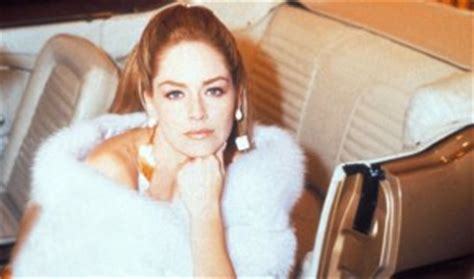
I saw Casino a couple months ago so I may not be able to pull as much evidence as I like in this post, but I was just watching a video on analyzing the gold-digger trope in movies, and was reminded of Ginger from Casino.
The thing is, Ginger is so utterly unlikeable in my opinion. There is nothing so unlikeable as a pathetic, self-sabotaging character, because you cannot help but empathize with her, while you also want to scream at the screen in frustration, "get your act together!" You are in the most uncomfortable situation of watching their deserved downfall, but not quite being able to enjoy it as you would an antagonist (It is actually surprising to see that in the Casino wiki page, Ginger is classified as an "antagonist," which I did not feel when I watched the film).
The thing I didn't like about the movie--which is done so often to female characters--is establishing her as badass and shrewd, but then that personality is almost completely lost the rest of the film as soon as that characterization is established. I was excited when Ginger first showed up, because she was the only dimensional female character, and I could see that although she engaged in an unfair system, it was a matter of survival. In a cruel, male-dominated world, she weaponized what she had (her good looks, vivacious personality, and smarts), to stay alive. She was empowering in a way, beating the men around her at their own game.
And yet she had her weakness--I don't even remember his name and I do not want to look it up because I want to erase his measly existence from my mind as much as possible. We will call him the boyfriend. Ginger has a boyfriend from before her hustling days, who doesn't work, cheats on her, and yet she gives all her earnings over to him. It seems she loves him...but for what? It is utterly confusing, but also not totally unrealistic. There are plenty of women who get caught in such toxic relationships. This was utterly painful to watch as a viewer, and made Ginger incredibly unlikeable, because it seems the promise of at least one smart and successful female character was betrayed. It also almost seems like Ginger is being punished for taking advantage of the men around her by having this fatal flaw. Another interpretation could be that this flaw humanizes Ginger, makes her more endearing, "she screws men around by she actually has a loyal, feminine heart towards this one," which I certainly hope wasn't the intention, because this flaw is absolutely not a redeeming quality, and there is nothing that Ginger needs to redeem in the first place, imo, as "gold-digging" for women like her is a matter of survival in a harsh world.
But what I primarily want to talk about in defense of Ginger, is how CLEAR she made it at the beginning, that while she enjoyed Sam's company, she did not love him. Her integrity is truly remarkable in the scene where Sam first proposes to her. She CLEARLY tells him she does not love him, and thinks they should not get married. Considering a man just professed his undying love her, she is nice, but honest as possible. And this is her, who is usually only concerned with money, turning down the wealthiest man in town! But Sam says basically that he doesn't care and that she can grow to love him, and convinces her to marry him. And I mean as handsome as Robert DeNiro is, he is an old man, lusting after this young, beautiful Ginger. Would he "love" her without her looks? I often wondered.
So it felt like they were both getting something out of the deal, Sam gets a hot, young wife, Ginger gets financial security. And yet the movie seemed to play it off often as if Sam was this hopeless romantic, and Ginger was this duplicitous femme fatale that took advantage of him. As I said before, she is made out to be very unlikeable, which only gets worse throughout the film, but again and again as a viewer, I had to remind myself, he convinced her to marry him knowing she didn't love him! He openly seduced her with promises of financial security, so isn't it within her rights to then run away with the bank account money he left her? And does he even really love her? We get so caught up in Sam's perspective, and we lose sight of the original propositional nature of their marriage, how honest Ginger was up front. This is all lost as Ginger makes mistake after mistake, and is shown to not be at all loyal to Sam--but again, she never really promised loyalty, and Sam should not have expected it of her, both with her character being an unbendable hustler growing up, and also the fact that she didn't love him and never really pretended to.
Like every character, Ginger is deeply flawed. She is selfish, and is given the gendered characterization of being hysterical as compared to Sam's moderated, pragmatic, calm. But I think she also deserves a defense against many of our inclinations to instantly dislike her for not being more grateful or loyal to Sam.
2 notes
·
View notes
Text
Well shit. Guess who fell in love with some more fictional characters overnight?
19 notes
·
View notes
Text
Snow White from Red Shoes is the best animated princess for a lot of reasons and one of them is that canonically she could bench press her entire husband if she felt like it
2K notes
·
View notes

